CHEGA cai em todos os Concelhos
O Chega foi o partido que registou a maior quebra nas eleições do dia 9 para o Parlamento Europeu, em comparação com as recentes eleições do dia 10 de Março para a Assembleia da República.. Essa diminuição aconteceu no conjunto do país e nos Açores. No caso da Região verifica-se que essa situação se verificou em todos os concelhos.
Parlamento Europeu - 2024
Elections in a Europe with greater weight

Rafael Cota ,
Journalist who lives in Terceira Island, Azores
Artigo publicado numa revista informativa da Universidade de Fresno na Califórnia, destinada a alunos descendentes de portugueses que já não falam português. A Revista é dirigida pelo professor Diniz Borges, natural da Terceira-
Elections for the European Union are on Sunday, June 9th. The Azores, one of the most outer regions of the European Union, will be part of this election. We are happy to feature this excellent article by a journalist from the Azores, who has been analyzing elections in the Azores for many decades.
Date: June 4, 2024Author: Diniz Borges

Another election is approaching, the third this year in the case of the Azores, to choose representatives for the European Parliament.
As usual, the results of the last elections are published to remember how people voted five years ago in the country and in the Azores. In that time, a lot has changed in the Portuguese political spectrum and in the region, and these changes have already been felt in the elections for the Regional Legislative Assembly and the Assembly of the Republic, namely with the entry of Chega onto the political scene, when in 2019 he didn’t even appear on the lists.
Changes are also expected in next Sunday’s elections. However, there is no direct relationship between the different electoral acts since citizens have learned to vote according to the object of each election.
Abstention is expected to remain high as this election arouses the slightest interest. A comparison of abstentions shows that the proximity of the election influences the number of voters who go to the polls. In the last EP elections, only 18% of Azoreans went to vote, which was not the case in other close elections.
However, as time passes, Europe is getting closer, more names are known, their voices are heard at European and international levels, and their decisions are becoming increasingly relevant in different countries.
Anyone who watches the news regularly can already identify several names, and it feels that leaders with some weight are beginning to emerge in Europe.
In Portugal, 17 political forces are running.
17 parties and coalitions are running in the European Parliament elections, the same number as in 2019. According to the lists posted at the Constitutional Court (TC), the following are running: Aliança Democrática (a coalition made up of PSD, CDS and PPM), PS, Chega, Iniciativa Liberal, Bloco de Esquerda, CDU (PCP/PEV coalition), Livre, PAN, ADN, MAS, Ergue-te, Nova Direita, Volt Portugal, RIR, Nós Cidadãos, MPT and PTP. Four-party forces were not accepted.
The AD list is headed by former journalist and television commentator Sebastião Bugalho, followed by PSD vice-president Paulo Cunha. The PS list is led by former Health Minister Marta Temido and has former Socialist parliamentary leader Francisco Assis as number two.
Chega is betting on diplomat Tangier Correia as number one, while Iniciativa Liberal has chosen its former president João Cotrim Figueiredo as its list head. The Left Bloc has also chosen a former leader to head its candidacy for the European elections, presenting Catarina Martins.
The CDU (a coalition of the PCP and the PEV) has chosen former parliamentary leader João Oliveira as its candidate. Livre has chosen researcher Francisco Paupério, who will run in the elections for the first time. The PAN’s number one candidate for the European elections is party leader Pedro Fidalgo Marques.
The PS won the elections with 33.38%, electing nine MEPs. The PSD came second with six seats, followed by the BE and CDU with two MEPs, and the CDS and PAN elected one representative.
Candidates nominated by the Azores

The national lists include André Rodrigues, nominated by PS-Azores, who is in 5th place, and Paulo Nascimento Cabral, nominated by PSD-Azores, who is in 7th place.
The Liberal Initiative, BE, CDU, Chega, and PAN also have candidates nominated by the Azores on their lists.
As usual, this election is held with the same list for the whole territory, and the elected members represent the entire country. However, once elected, they fall into the different groups in the European Parliament.
Since the beginning, the Region has been able to elect MPs nominated explicitly by the Azores. In the last elections, held on May 26, 2019, André Bradford was elected, although he only served for about two months due to his death on July 18. He was replaced by Isabel Carvalhais.
The presence of deputies nominated by the region has proved vital because they promote the Azores’ name by discussing some issues and collaborating with other areas facing the same problems.
In fact, Europe’s decisions have increasing weight in different countries, and its guidelines are usually challenging to contradict, given the framework in which they are taken. In short, a rising European population is growing, and awareness of this phenomenon may affect voter turnout.
Results since 2004 in the Azores for the EU elections.

The abstention rate in the Azores for the EU elections since 1987

Deputies elected from the Azores since 1987.

NOVIDADES thanks journalist Rafael Cota for his excellent work.
Translated to English as a community outreach program from the Portuguese Beyond Borders Institute (PBBI) and the Modern and Classical Languages and Literatures Department (MCLL) as part of Bruma Publication and ADMA (Azores-Diaspora Media Alliance) at California State University, Fresno, PBBI thanks Luso Financial for sponsoring NOVIDADES.
THE ISLANDS AND THE DIASPORA
O artigo publicado no DI com o título "Eleições nacionais com muitas interrogações" foi transcrito, em Inglês, pela publicação da Universidade de Fresno, na Califórnia, dirigida por Diniz Borges.
NOVIDADES - THE ISLANDS AND THE DIASPORA
Portuguese National elections bring up many questions including in the Azores.
After the regional elections – still with doubts about how they will turn out – attention is now turning to the national elections, where the campaign is conducted with more doubts than certainties.
The results of the regional elections are not expected to have much influence on the election to the Assembly of the Republic. These are different frameworks and different situations. It is possible that the solution adopted in the Azores will be included in the debate.
In any case, it makes sense to recall the results of the last elections to the Assembly of the Republic, both in the Azores and the country, to refresh our memories. At a national level, too, the circumstances that marked the holding of this election are, in many ways, strange and could determine the direction of many votes. The polls are giving some clues, but many questions remain.
Perhaps the most certain element is that abstention will also fall at a national level, given the greater intensity of the debates and the doubts being raised, which could have consequences for people.
Looking at the graphs of the 2022 results, you can see that the PS won the elections, both nationally and in the region, and it was possible to build a stable national government, although with a lot of turbulence in various sectors.
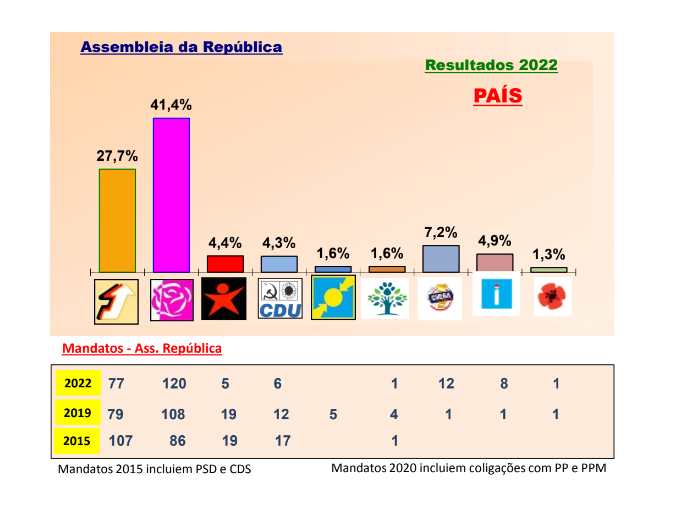
The graph below shows the results of the 2022 election in the Azores.
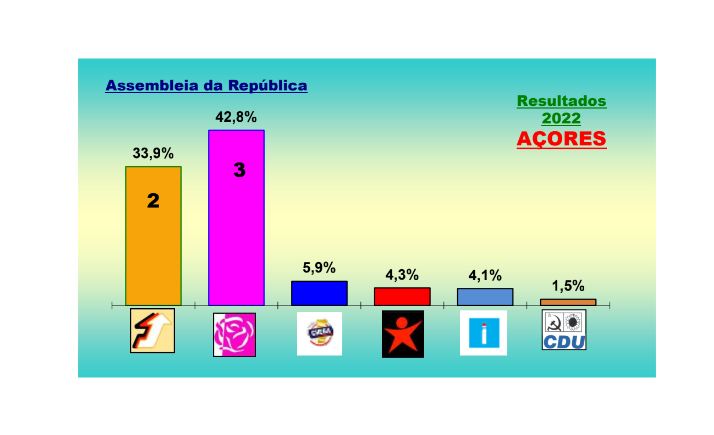
What will happen in the Azores?
As far as the Azores are concerned, it’s not easy to imagine what will happen. As has already been said, it is not straightforward for the results of the regional elections to influence the election to the Assembly of the Republic. At this point, people are increasingly politically aware and vote according to the election.
However, both the electoral campaign and the regionals’ final speeches will influence how people view these elections. In informal conversations, people liked Bolieiro’s firm speech and appreciated the fact that he had put CHEGA in its place. It was often said that if the elections were repeated, the PSD would win by a majority.
The PS leader wasn’t so happy, and during the campaign, he didn’t manage to counteract his less-than-empathetic image of dealing with people.
Ventura did his best to win the national elections by improving his results. Still, his representative in the region didn’t live up to the hype, and a few “gaffes” during the election campaign gave rise to the idea that CHEGA, despite growing in electoral terms, is a project with an expiration date, as has happened to several other similar parties.
The rest of the parties have been the same, with a close electorate, and it is believed that they will maintain similar results.

In any case, the campaign waged by the national leaders, who have a greater presence in the media and are the ones who are fundamentally on trial, will count above all.
But just as in the regional elections, voters will seek stability. In the country as a whole, people haven’t understood the need for this election either, so they will weigh up very carefully which side is best placed to lead a solid government.
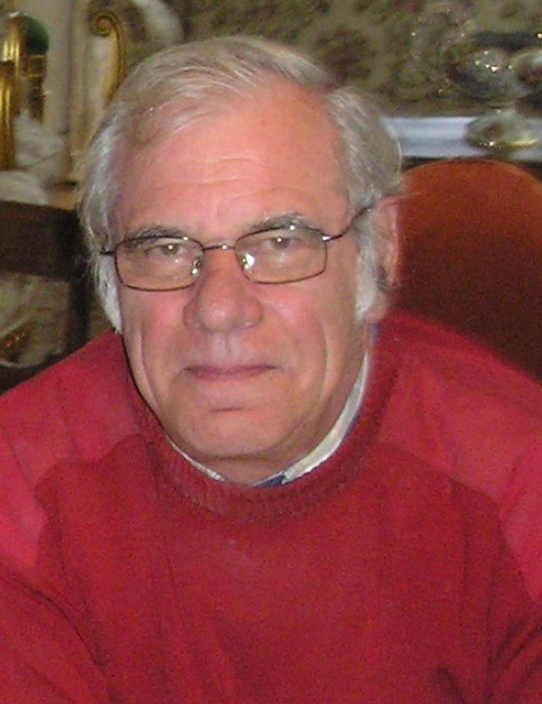
Rafael Cota-Journalist
Eleições Assembleia da República
Eleições nacionais com muitas interrogações
Passadas as
eleições regionais -- ainda com dúvidas sobre o que se vai desenrolar -- as
atenções voltam-se agora para as eleições nacionais, onde a campanha se faz com
mais dúvidas do que certezas.
Não se espera
que os resultados das regionais tenham grande influência na eleição para a
Assembleia da República. São quadros diferentes e situações também com outros
contornos. Possivelmente, entrará no debate, sim, a solução que vier a ser
tomada nos Açores.
De todo o
modo, tem sentido relembrarmos os resultados das últimas eleições, para a
Assembleia da República, tanto nos Açores como no País, para refrescar a
memória. Também a nível nacional as circunstâncias que marcaram a realização
deste ato eleitoral são, em muitos aspetos, estranhas e podem marcar a
orientação de muitos votos. As sondagens vão dando algumas pistas mas mantêm-se
muitas interrogações.
Porventura, o
elemento mais seguro é que a abstenção também baixe a nível nacional face à
maior intensidade dos debates e às dúvidas que se colocam e que podem ter
consequências para as pessoas.
Olhando os
gráficos dos resultados de 2022 pode ver-se que o PS ganhou as eleições,
tanto a nível nacional como na Região e foi possível construir um governo
nacional, aparentemente estável, embora com muita turbulência em diversos
sectores.
Que se
passará nos Açores ?
No tocante
aos Açores, não é fácil imaginar o que irá acontecer. Como já se disse, não é
linear que os resultados das regionais tenham influência na eleição para a
Assembleia da República. Neste ponto, as pessoas têm cada vez mais consciência
politica e cada vez mais votam de acordo com a eleição em causa.
No entanto,
tanto a campanha eleitoral como os discursos finais das Regionais vão ter
influência na forma de ver estas eleições. Nas conversas informais as pessoas
gostaram do discurso firme de Bolieiro e apreciaram o facto de ter colocado o
CHEGA no seu lugar. Ouvia-se, recorrentemente comentar, que se se repetissem as
eleições o PSD ganharia por maioria.
O líder do PS
não foi tão feliz e durante a campanha também não conseguiu contrariar a imagem
do seu autoritarismo e a forma pouco empática de lidar com as pessoas.
Ventura fez o
possível para ganhar trunfos para as eleições nacionais, fazendo valer a
melhoria dos resultados, todavia o seu representante na Região não esteve à
altura dessa aposta e algumas "gaffes" da campanha eleitoral, fizeram
crescer a ideia de que o CHEGA, apesar de estar a crescer em termos eleitorais,
é um projeto com prazo de validade, como já aconteceu a vários outros
partidos semelhantes.
Os restantes
partidos, têm sido iguais a si próprios, com um eleitorado de proximidade e
crê-se que manterão resultados semelhantes.
Mas, tal como
nas eleições regionais os eleitores vão procurar eleger a estabilidade. No
conjunto do país as pessoas também não compreenderam a necessidade desta
eleição e, portanto, vão pesar muito bem qual dos lados se apresenta com
melhores condições de conduzir a uma governação sólida.
DI - Entrevista
1 - Qual a
análise que faz aos resultados eleitorais na sua ilha? Quais as causas e as
consequências previsíveis desses resultados?
A Terceira é
uma das ilhas onde há uma das melhores culturas democráticas, por razões
históricas. Já em 1992, quatro anos antes da queda do PSD, o PS venceu em Angra
do Heroísmo e no conjunto da ilha ficou a décimas de bater o PSD.
É uma ilha
que tem pouca iniciativa no campo da concretização de projetos, em
contrapartida tem uma formação política que vêm desde a implementação da
autonomia cultivada pelas pessoas que idealizaram o projeto autonómico e em
tempos tiveram a coragem de encarar o regime.
Nestas
últimas eleições regionais, a Terceira votou de acordo com a maioria, como já
se esperava mas, se for necessário, também vota contra a ordem geral.
De resto, a
Terceira tem várias queixas contra o regime, pelas orientações, sobretudo, na
área do turismo e da operação aérea e um dia isso poderá sentir-se nas urnas.
2 - José
Manuel Bolieiro decidiu avançar com um governo de minoria. Como avalia essa
opção no contexto parlamentar que passa a existir?
É uma opção
que lhe trará algumas dores de cabeça. Mas, a sua posição firme no sentido de
não ficar prisoneiro de outros forças partidárias valeu-lhe um grande capital
político. Creio que conseguirá tirar partido desse facto.
Na verdade,
os outros partidos também não têm todos os trunfos que julgam, porque a
repetição de eleições pode não lhes ser favoráveis.
3 - Como
avalia os resultados do PS e do Chega na Região? O que justificará tais
resultados e o que indiciam para o futuro?
O resultado
do PS resulta fundamentalmente da falta de inovação no campo dos projetos.
Muito do que foi criticado, poderia ter sido feito pelo próprio PS enquanto
governo.
Contou,
porventura, de igual modo, a imagem que se foi generalizando, relativamente à
forma pouco empática do líder.
Por outro
lado, quando se fala em renovação de listas é uma ideia que nem sempre
funciona. Degrau a degrau se fazem políticos com maior solidez.
O Chega é um
fenómeno novo -- em 2015 não tinha nenhum deputado à Assembleia da República,
em 2019 obteve apenas um mandato e em 2022 já atingiu 12 deputados. É uma força
política que segue o seu percurso na Região, como no país e pela Europa fora.
Segundo Victor Matos, autor do livro "Na Cabeça de Ventura", o que
alimenta o CHEGA é mais um voto de indignado do que protesto..
4 - Com o
histórico existente, parece-lhe pertinente equacionar uma qualquer abordagem ao
sistema eleitoral que, por exemplo, possa tender mais para soluções de
governabilidade?
Neste
momento, julgo que não há necessidade de proceder a alterações ao sistema
eleitoral. Os Açores já deram um salto de gigante no sentido de alargar o leque
partidário do parlamento com a implementação do Círculo de Compensação.
O resto é
feito segundo a vontade do povo que vota como entende nas diferentes eleições.
O resto cabe
ao diálogo e à capacidade do Parlamento em encontrar soluções para formar um
governo. Não há espaço para chumbar permanentemente os governos, porque o povo
perceberá e no tempo certo votará de forma a conseguir um governo estável.
Também não é
saudável para a democracia governos prolongados durante décadas como tem
acontecido.
Artigo sobre eleições publicado na Universidade de Fresno, na Califórnia.
O artigo que saiu no "Diário Insular" com o título "O que pode mudar nas eleições de 4 de Fevereiro" foi publicado nos EUA numa boletim informativo da Universidade de Fesno, coordenado por Diniz Borges, com informação sobre os Açores, destinada a pessoas de segundas e terceiras gerações, que já não falam português mas gostam de acompanhar o que se passa na terra de seus pais e avós.
1 AZORES CONNECTION - LIGAÇÕES AOS AÇORES, EVENTS-EVENTOS, INFORMATION--INFORMAÇÕES, NEWS-NOTÍCIAS
Elections in the Azores: What could change on February 4, 2024
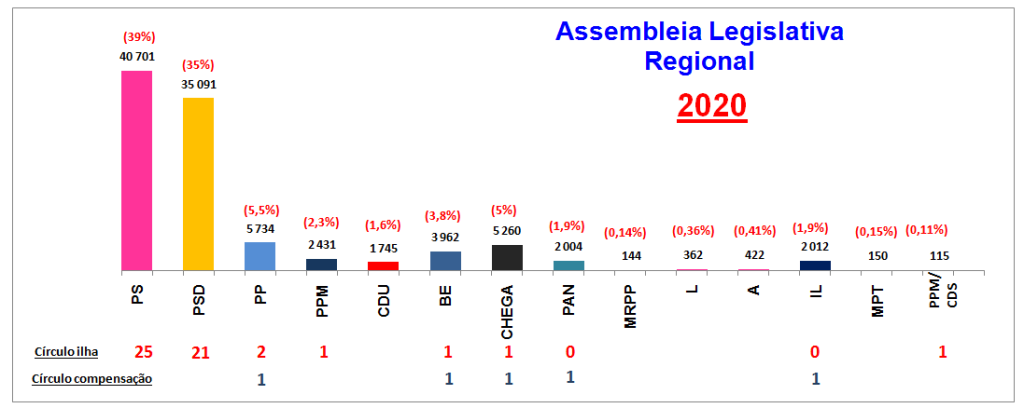
The graph above shows the results of the elections in 2020. As you may recall, there wasn’t much of a door-to-dorr campaign because of the pandemic
At a time when regional elections are being held, it makes sense to review the last election’s results, at least to refresh our memories. The circumstances that marked the holding of this election are, in many ways, strange and may have influenced the results.
Perhaps the most certain element is that abstention, which had already fallen in 2020, may even lower given the more intense and exciting debate expected in the face of the doubts that have arisen. Rarely has an election attracted so much attention in the Azores. Much more than expected. From the circumstances that brought down the government to how the elections were scheduled and the issues that have been discussed in the corridors of power to the broader public debate. Circumstances that, in the opinion of many, will make the political picture different. Most people want a more stable government to emerge, one that is not at the mercy of quasi-personal discretion.
What the last elections show us
Looking at the graph of the 2020 results, you can see that the PS won the elections, but because of what happened nationwide, the PSD found partners to ensure the formation of a government. With a minimal difference. At the time, it was said that this was an unsound solution and, above all, one that made no ideological sense.
That solution ended up lasting longer than many predicted. Bolieiro’s government managed to survive and gain a good image in many sectors, mainly because of its attitude towards people.
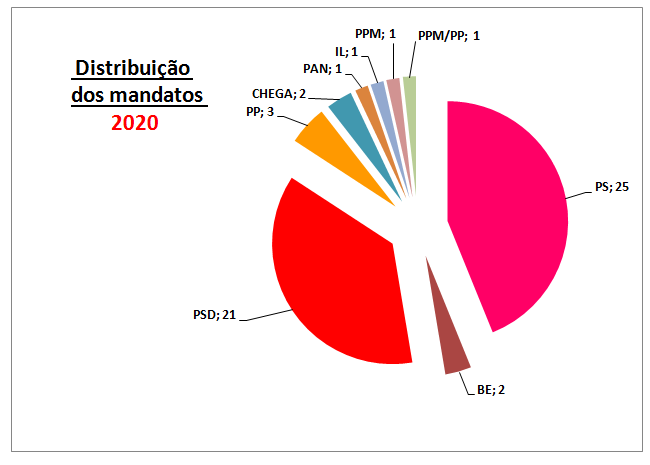
The graph above shows the number of seats in the Azorean Parliament from the prior elections in 2020
Doubts over the fall of the government
Without an obvious explanation, the parties stopped supporting the government, rejecting the 2024 plan with the message that they would not approve any other documents. An unclear position since it had nothing to do with the content of the proposals (which was what was actually at stake). Based on this information, in consultation with the Council of State, the President of the Republic decided to dissolve parliament and call elections, leaving many questions unanswered.
Naturally, this decision will be part of the debate and perhaps influence the electorate’s opinion. The same can be said about who was responsible for provoking these elections. Many have already said this, and Álvaro Dâmaso recalled it in a text published in Diário Insular: “The parties that bring down a government lose the following elections, so the experience goes, at least ours.”
What’s new
Contrary to what happens at a national level, where several polls have been published, there are no opinion polls in the Azores, at least not known ones. Of course, national polls have no validity in the regional context. Even on several occasions, the results in the Azores differed from the elections in the country as a whole, even when the dates were near each other.
What is new in the Azores that could influence the results? The PSD; CDS/PP, and PPM are now presenting themselves in a coalition, a phenomenon about which there are doubts as to the effects it will have on the electorate; the PS is presenting itself without innovations; CHEGA is no longer “taboo” and today people are openly commenting on what they think and also, if appropriate, assuming without fear who they will vote for; there will likely be a more active debate and a more intense campaign in the streets, which could reduce abstention and influence the results; in informal conversations, there is little discontent among farmers (a sector that has a considerable weight in the electorate), but within the civil service, there is displeasure, the reasons for which are not very clear; tourism will be very much in the debate, especially the options regarding air operations.
But perhaps what will carry the most weight is stability. Generally speaking, people don’t understand the need for this election, so they will weigh up very carefully which side is best placed to lead to stable governance.

Rafael Cota is a well-known, respected journalist in Terceira island, and this piece was for the newspaper Diário Insular, José Lourenço-director.


























